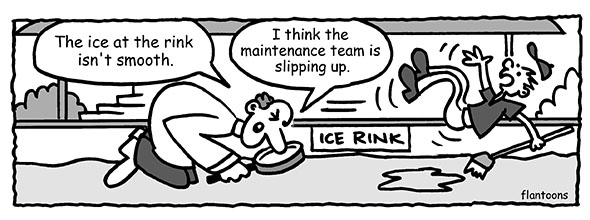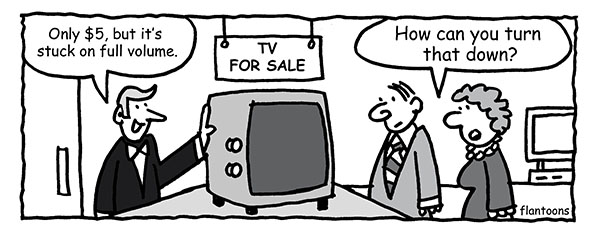
Get rid of; remove; put an end to
I wish we could do away with poverty.
To do something again from the beginning.
I need to do over the bedroom. My wife doesn't like the colour of the walls I just painted.
To fasten something (usually clothes)
Do up your shoelaces or you might fall.
To succeed in living or working without someone or something.
Up is a small word with a wide use in English. Today we look at phrasal verbs and collocations that feature it.
All can be an adverb, preposition, adjective noun and verb. Read through this text and choose the correct missing words.

This cartoon is based on the double meaning of slip.
Slip as a verb means to lose balance and perhaps fall, especially on a slippery surface like ice.
"Be careful of the ice. You might slip."
"She slipped on the wet floor and broke her ankle."
To argue and disagree with someone.
"She left the company after falling out with her boss."
For a plan or agreement to fail.
"John agreed to sell his car to Tom but the deal fell through. Now John needs to find a new buyer."
A phrasal verb is a combination of two or more words, usually a verb and preposition, which acts as one word.
The meaning of the phrasal verb is different to the meaning of the words when separated. For example, to "get away" means to go on holiday, which is different from the meaning of the word "get"on its own.
Phrasal verbs are common in both spoken and written English, so we should practise them as often as possible.

This cartoon is based on the phrasal verb turn down.
Verb phrases in English have the following forms:
A main verb:
We are here
I like her.
Everybody knows Peter.
She laughed.
A verb phrase with only a main verb is expressing the simple aspect.
Some verbs are made up of two parts; a verb and a particle:
Make + up -...are made up...
Grow + up
He is growing up into a smart young boy.
The particle often gives the verb a new meaning:
Take + in
It's difficult to take in so much information.
It's difficult to remember/absorb so much information.
A phrasal verb is a verb made up of a verb plus one or more particles (e.g. of, in, up) that modify or change its meaning. For example, the phrasal verb “give up” means “stop doing”, which is different from the meaning of the verb “give” when it stands alone. Phrasal verbs are some of the most common verbs used in everyday English. Here is an exercise using phrasal verbs for travel situations.
First match these phrasal verbs to their meanings:
Look at the context of each sentence and choose the correct definition. Good luck!
Get along/get on have a good relationship.
Take after resemble someone in your family.
Fall out argue with someone and never speak to him/her again.
Run in the family a genetic characteristic that’s common in a family.